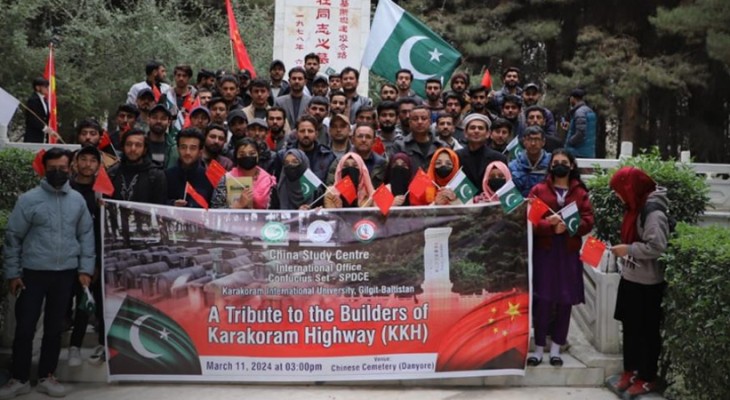GILGIT: The students, teachers, and officials of Karakoram International University paid tribute to the martyrs of the Karakoram Highway(KKH) at the Chinese Memorial Cemetery aka ‘China Yadgar’ in Danyore, Gilgit Baltistan.
The event was organized by the China Study Centre (CSC) International Office, Confucius-Set, and School of Professional Development and Education (SPDCE) to pay tribute to the engineers and workers who lost their lives during the construction of KKH, a route that connects the two brotherly nations.
During the event, participants laid flower wreaths over the graves of Chinese martyrs who sacrificed their lives during the construction of KKH, also known as the Eighth Wonder of the World.Senior officials from CSC, SPDEC, and Director of Public Relations at KIU, Amjad Ali, participated in the event.
They spoke about the importance of KKH, Sino-Pak relations, and the role of the China-Pakistan Economic Corridor (CPEC) in the economic development of Pakistan. Dr. Khalid Mehmood Alam, Assistant Professor at CSC, KIU, discussed the historical perspective of KKH.
Fifty-four Chinese individuals are buried in the cemetery. “Due to the sacrifices of Chinese and Pakistani workers, today both countries are connected,” said Mr. Mahmood, adding that China and Pakistan were always together in grief and happiness.
Dr. Sajjad Haider remarked that the sacrifices of the Chinese martyrs would always be remembered. He highlighted that the journey, which began with the construction of KKH, has continued to evolve.Today, KKH stands as an integral part of CPEC, creating economic opportunities and improving the lives of people in both nations.
KKH, also known as the China-Pakistan Friendship Highway, is a 1,300-kilometer highway that stretches from Hasanabdal in Punjab to GB in Pakistan and further extends into China.Constructed between 1966 and 1977, KKH stands as a symbol of the strong bond between China and Pakistan.
Tragically, the construction claimed the lives of 692 Pakistanis and 108 Chinese workers, highlighting the sacrifices made to create this vital route of connectivity and friendship media reported.
Meanwhile, the Karakoram Highway (KKH) was reopened for traffic after the boulders were removed from the blocked portion of the artery at the SumarNullah area of Upper Kohistan.
Thousands of passengers and motorists, including women and children, had been stranded in long queues of vehicles on both sides of the KKH for hours after a landslide blocked the road at SumarNullah in the morning.
“The vehicles passing through the landslide-prone part of the KKH escaped unhurt miraculously when the heavy boulders detached from the high mountainous and blocked the artery,” said a passenger.
Deputy Commissioner, Upper Kohistan, IrfanullahMehsud, when approached, said the personnel of Frontier Works Organisation along with heavy machines had reached the and cleared the blocked portion of the KKH to traffic. “Now the heavy boulders are removed from the artery and traffic is resumed,” he said.
Despite the partial opening of major roads, thousands of passengers still face difficulties due to the unavailability of transport between Gilgit-Baltistan and other parts of the country.According to sources, KKH reopened after five days of closure, but people were advised to avoid travelling on the road until full restoration.
GB government spokesperson Faizullah Faraq told media that KKH was blocked at multiple locations in Kohistan districts of Khyber Pakhtunkhwa (KP) and Diamer of Gilgit-Baltistan section after massive landslides following recent rain and snowfall.
He said that thousands of passengers were stuck in various areas, and although KKH was opened for one-way traffic on Tuesday, fresh landslides blocked the road at Pattan area of KP again.Now, KKH has been partially restored for traffic on Wednesday, with traffic operational on both sides and the KKH Kohistan and Diamer section cleared, he said.
MrFaraqemphasised the continued threat of landslides on KKH as rockfall persists in vulnerable areas, advising passengers to avoid unnecessary travel for the next three days.
Travellers complained that due to mud flow in Chilas at KKH, high vehicles remained stuck, and heavy traffic was later suspended in the area until the mud was cleared from the road.Meanwhile, after remaining closed for five days, the Baltistan Road and Astore Road have been opened for light traffic.


